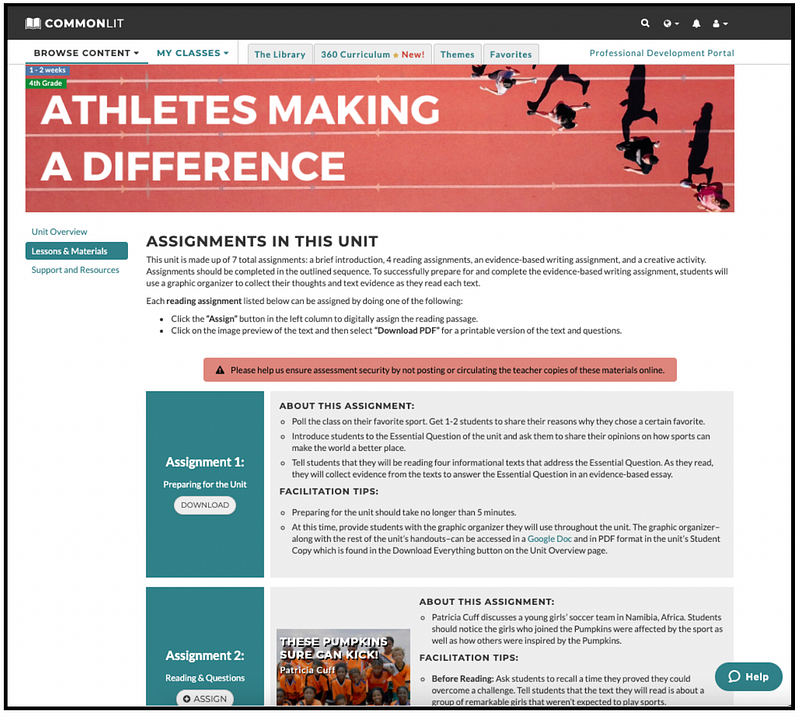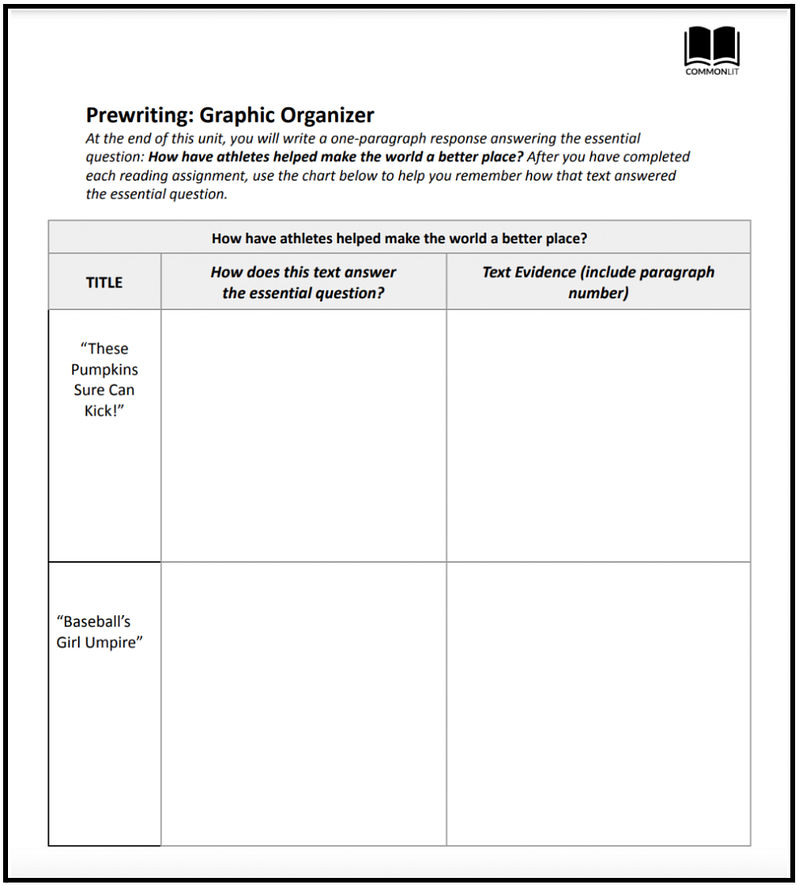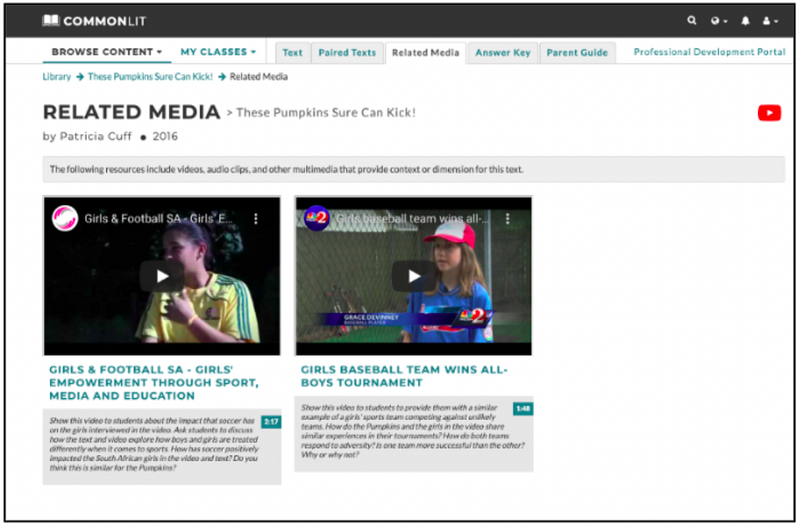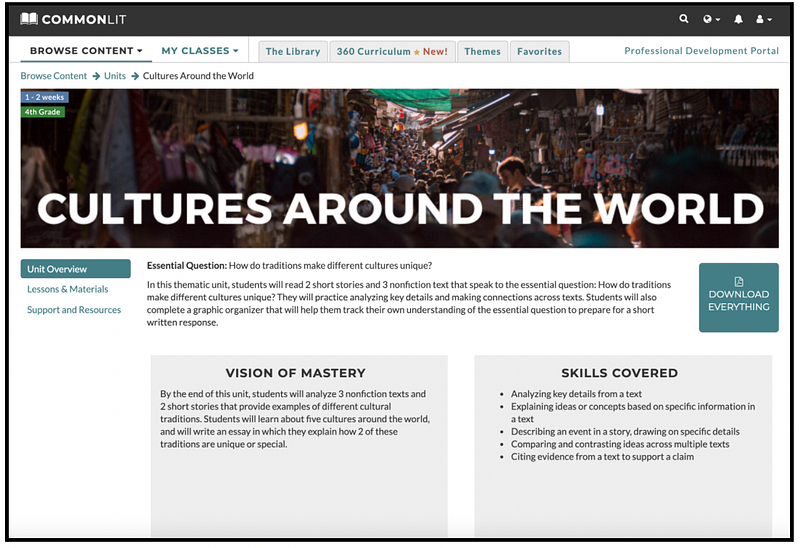 Elementary Classrooms
Elementary Mini-Units to Support Reading Engagement and Knowledge Building
Elementary Classrooms
Elementary Mini-Units to Support Reading Engagement and Knowledge Building
Learn all about CommonLit’s high-quality units that include engaging texts, meaningful writing assignments, and much more for students in grades 3–5.
As a teacher, I used to spend countless hours looking for the perfect texts to include in my units. I searched Google. I searched educational websites. I searched and searched and searched. I often felt like I was spinning my wheels but getting nowhere. I normally felt good about the final product, but I was frustrated because searching for texts took too long and that was only half the battle. I had a million other planning and teaching responsibilities that took up my time as well.
That’s why we’re so excited to tell you more about our Mini Units for Grades 3–5. These units are guaranteed to save you valuable time and engage your students. A win, win!
CommonLit’s Mini-Units for Grades 3–5
Each of these units include an engaging and meaningful essential question, 4 to 6 high-interest texts that guide students toward answering the essential question, graphic organizers to support understanding, and a final writing lesson that allows students to reflect upon and synthesize what they’ve learned. Teachers can access all of these units in both a digital and printable format.
Most mini-units include suggested instructional moves for before, during, and after reading the texts to deepen students’ engagement. The before reading tips help activate students’ background knowledge. For during reading, there is a suggested annotation task. The after reading tips include suggestions like discussion questions or activities you can use to solidify or extend students’ thinking.
To show you how these units work, let’s look more closely at a 4th grade unit entitled “Athletes Making a Difference.”

The Essential Question and Text Selection
This unit is centered around the essential question, “How can sports help to make the world a better place?” Throughout the unit, students read four texts that explore this question.
In the first two texts of the unit, students learn about young women who have broken barriers. The first text is about the Pumpkins, the first girls’ soccer team from Namibia. The team not only worked hard to improve their soccer skills, but they also became role models for other girls around the world. The Before Reading tip with the text asks students to think about a time they overcame a challenge so that they begin to make connections between the Pumpkins’ experiences and their own.
Next, students learn about Amanda Clement. In 1904, she became the first woman on record to umpire a men’s baseball game. The During Reading tip for this text asks students to highlight details from the text that explain why Amanda Clement was a good umpire. In reading this text, students deepen their understanding of women like Clement who have broken barriers.
In the final two texts of the unit, students learn about a couple of professional basketball players who have overcome significant obstacles and have inspired others. First, they read about Tamika Catchings, a WNBA all-star, who was born partially deaf. Next, students learn about Charlie Villanueva, a former NBA player, who was born with alopecia. The After Reading tip with “Reaching New Heights” asks students to discuss how Catchings and Villanueva both learned to accept the things that made them different. Both Tamika and Charlie were bullied as children due to their differences, but worked hard to reach their dreams and have become positive role models for kids.

As students read the texts in the unit, they’re encouraged to reflect upon the essential question and to collect evidence to help them answer it in a graphic organizer.

Evidence-Based Writing Response
Each unit includes an evidence-based writing prompt. In the “Athletes Making a Difference” unit the writing question is:
"How can sports help to make the world a better place? Support your answers using reasons and evidence from a variety of the texts covered in this unit."
Our goal when designing these units was to create final assessment questions that are rigorous yet straightforward. Ideally, after students read the texts in this “Athletes Making a Difference” unit, they will be armed with a lot of information and ideas about how sports can improve the world.
Creative Activity
There is also an optional creative activity included with most units. The creative activities are a great opportunity for students to extend their learning in a different way. These activities include options like writing stories and crafting original poems. Through these assignments, students practice important skills like presenting, collaborating, and reflecting. In the “Athletes Making a Difference” unit, the creative activity prompt is:
"Now that you have examined how sports, teams, or athletes can help make the world a better place, think of a sport or activity that you enjoy doing. How can it help the world or people that participate in the activity? Create an eye-catching poster advertising your sport or activity to the class. Be sure to make it clear what the activity is, why the activity is fun, and how it can benefit people."
Creative activities in other units include options like writing stories and crafting original poems. Through these assignments, students practice important skills like presenting, collaborating, and reflecting.
Additional Benefits of CommonLit’s Mini Units
The lessons within CommonLit’s mini units also include all of the lesson planning tools and accessibility tools that teachers and students love.
All lessons include Related Media, Paired Texts, Assessment Questions, Guided Reading Mode Questions, and more to support teachers.

If teachers choose to use the digital version of these lessons with their students, students will have access to a host of our digital accessibility tools including text-to-speech, translation, and digital annotations. To learn more about these tools, click here.
More Mini-Units in the Library
Check out some of our newly added elementary mini-units! Your students can explore Cultures Around the World, The Power of Words, Feelings About Nature, Women Who Made a Difference, and more. Keep checking back this year as we add more supplemental units to our library!

Next Steps
We hope you love these units for elementary students! Find more great lessons for grades 3–5 in the CommonLit library.
If you’re interested in learning all about CommonLit’s free digital literacy program for elementary students, join one of our upcoming webinars!

